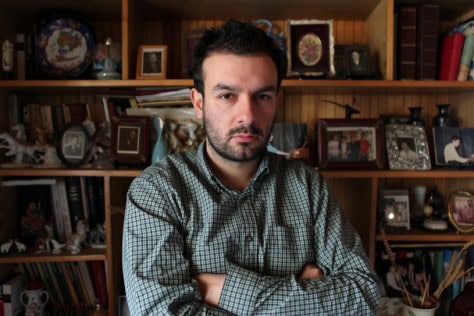Some know Eugene Mirman as a stand-up comedian whose sets often feature non-sequitur one-liners about bears, recorded conversations with credit card companies, coupons for “two minutes of ass party” and Name That Tune-style indie rock trivia games. Others are familiar with his roles on such television shows as Flight of the Conchords, Aqua Teen Hunger Force and Home Movies or may have seen him on the Comedians of Comedy tour with Patton Oswalt, Zach Galifianakis and Brian Posehn.
However, few people understand that Eugene Mirman is deeply skilled in the art of advice giving. Through his Web site, eugenemirman.com, the Lexington, Massachusetts, native-turned-Brooklyn, New York, resident has helped thousands with personal problems ranging from dating to child rearing to band names. Now he’s whittled his vast wealth of knowledge and experience into one well-organized, easy-to-follow book, The Will to Whatevs, published by Harper Perennial on February 10. We asked the newly minted author about his debut, which provides step-by-step instructions on important decisions like how to deal with high school, how to break up with someone, how to become a fascist dictator and how to get into Heaven, aka Goodtimes.
Why did you decide to write a self help-style guide to life?
I used to work at a crisis hotline as a teenager. I don't remember that much of my training and I thought it would be fun to mislead a generation about how to live life.
What research did you do for the book? What experts did you consult, if any?
I spoke to several experts, but not about the book. Oddly enough, I did a great deal of research, because I wanted the book to have lots of facts that were a little wrong, but not completely wrong. And to do that, I had to know the actual information. It takes just as much work to be wrong as to be right, but it's more fun.
How much was based on your own experiences?
Most of the things that sound like true stories are. Most of the things that involve magic or me talking to Don Henley are made up. One true story is about someone I went to high school with (this is over 100 years ago—we are both vampires!) who was very mean to me. He emailed me several times for weeks wanting to meet up in Boston. I had no idea why he wanted to see me. Eventually we did meet up at a show of mine in Somerville, Massachusetts, and it turned out that what he wanted to do was apologize to me for being a jerk 15 years prior. It was very sweet of him. What was funny is that when we were in 10th grade he threw fire in my hair in science class, but he didn’t actually remember that at all. He wanted to apologize for other mean stuff that I couldn’t recall as much.
What was the most life-changing moment in your life?
Probably when my parents brought me from Russia to America as a young man, and I then saw Knight Rider and was blown away by America’s talking bullet-proof cars.
Have you ever been to therapy? Do you recommend it?
No, I’ve never gone. It was fine not going. I do recommend it though, because everyone I know who has gone says it’s helped.
How do you know so much about the afterlife?
I am not the only one who knows—I’m just the only one who knows accurately. A lot of it is deciphering clues. Have you ever heard the Bob Seger song “Shakedown” from the Beverly Hills Cop II soundtrack? Well, let’s just say that’s not the only song loaded with clues. Plus, I’ve studied the spiritual works of most cultures, not just the song “Shakedown.”
Who was this book written for? How many people do you hope read it?
It was written for everyone, especially the following people: awkward teens, college kids who were awkward teens, adults who were awkward college kids and Jon Hamm from Mad Men. I hope 4 million people read it. I will be satisfied if about 4,800 finish it and about 12,000 read parts.
Why should anyone listen to you?
Most people agree that I am the most knowledgeable person in the world. You can disagree, but I ask that you actually ask everyone in the world, because most likely the first 700,000 people will disagree. But then after that, you’d be surprised.
You included details that would keep the book relevant until 2085—do you think people will even be reading books then? If not, how will they get valuable information like that which you’ve laid out so clearly in this book?
One of the ideas I mention in my book is a book you read by eating it. So that will be one way people learn. Another might be through Amazon Kindle or audio books. It will be a little much to download a whole book right into someone’s brain, so I’d rather avoid that. What we need to watch out for is an oddball scientist trying to invent a suppository that dissolves information into your anus. It would make school super weird. But alas, who knows? The future marches on.
 Q&A with Larry Gus
Q&A with Larry Gus We Own the Night: The Edison
We Own the Night: The Edison
No Comments